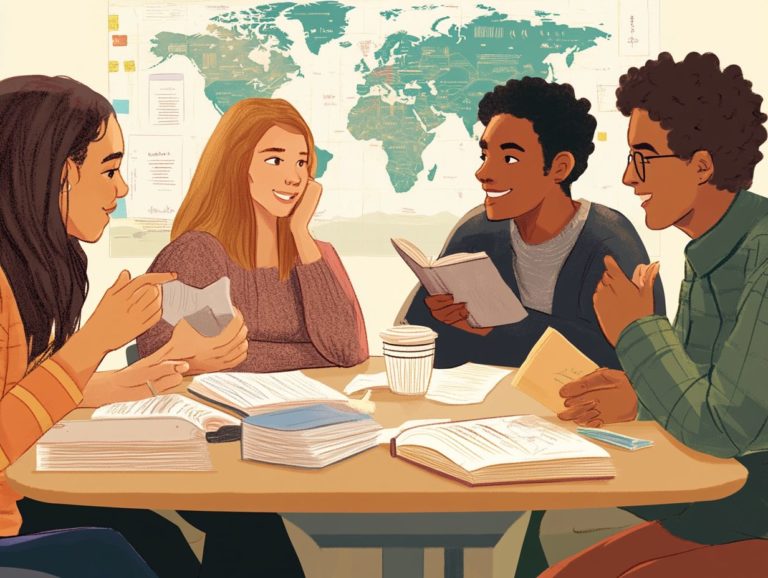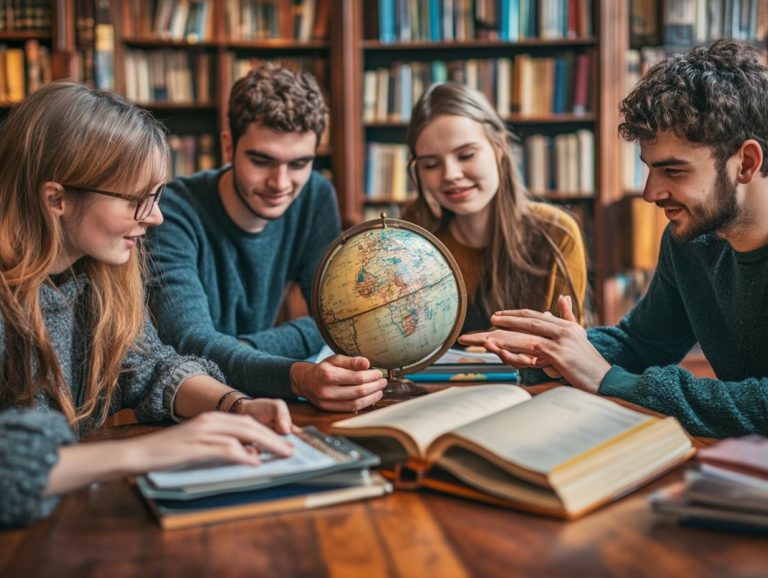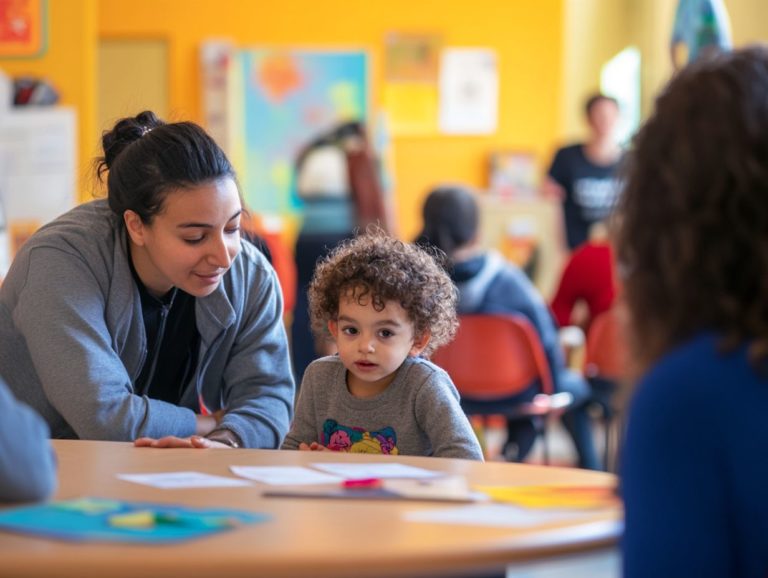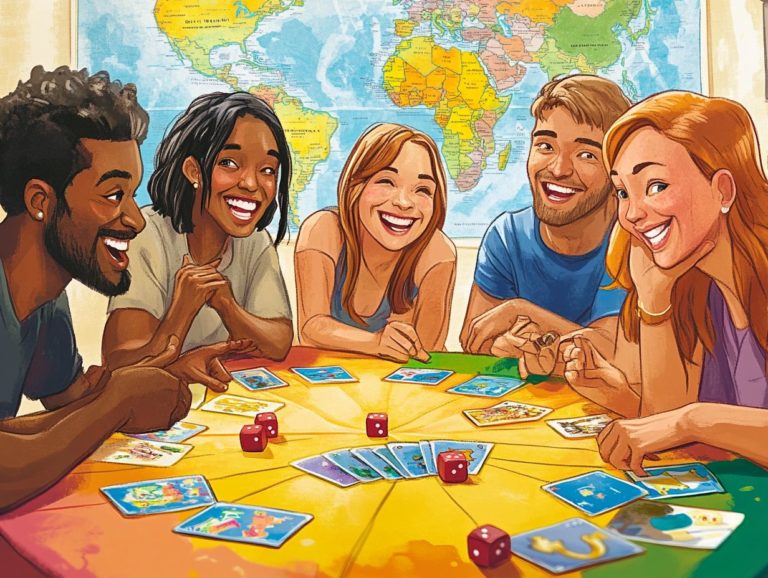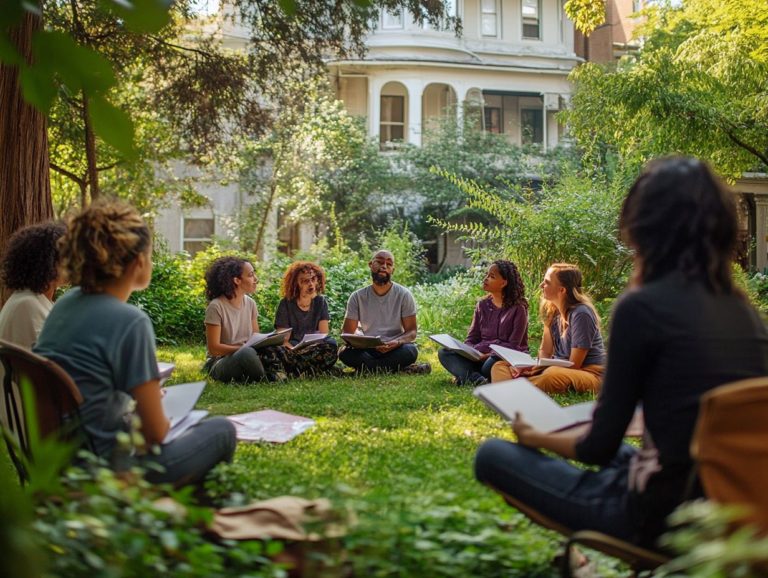the impact of cultural events on language learning
Cultural events provide vibrant gateways to language learning, enriching your experience far beyond textbooks and classrooms.
From lively festivals to immersive programs, these occasions allow you to dive into authentic language use and appreciate cultural nuances firsthand.
Engaging in cultural events can significantly enhance your language acquisition. They offer exposure to native speakers and boost your confidence in real-world conversations.
Cultural events tackle the challenges of accessibility and help you balance cultural experiences with traditional learning methods.
Discover the multifaceted role that cultural events play in language education! Dive into a deeper understanding of your target language.
Contents
- Key Takeaways:
- Cultural Events that Facilitate Language Learning
- The Role of Cultural Events in Language Acquisition
- Challenges and Limitations of Using Cultural Events for Language Learning
- Frequently Asked Questions
- What cultural events impact language learning?
- How do cultural events affect language learning?
- Can attending cultural events improve language skills?
- What challenges come with using cultural events for language learning?
- How can learners maximize cultural events?
- Do virtual cultural events impact language learning?
Key Takeaways:
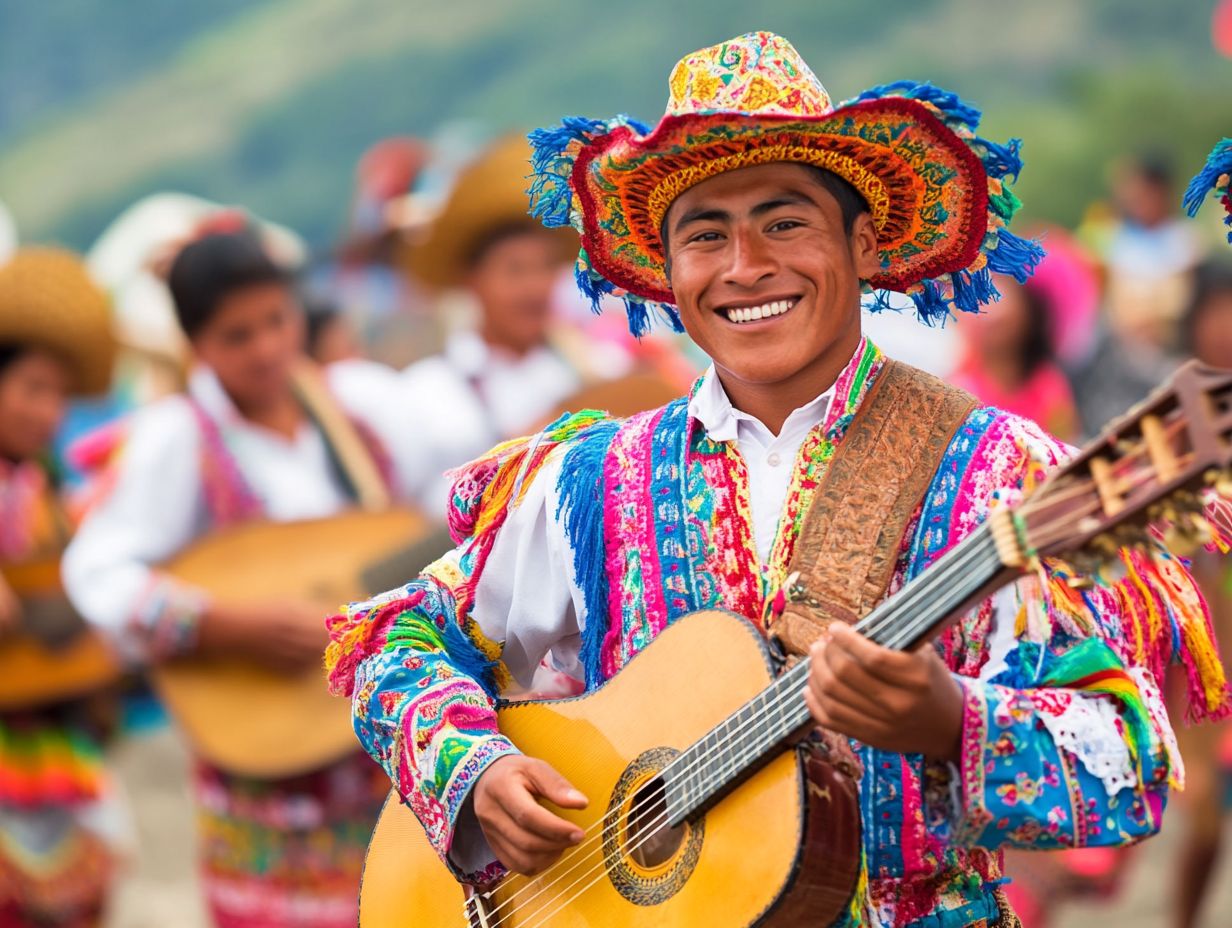
Cultural events provide a unique and immersive environment for language learning. They allow learners to experience language in its natural cultural context. Festivals, celebrations, and language immersion programs are effective cultural events that enhance language acquisition by offering opportunities for real-life practice and exposure to native speakers, highlighting the role of cultural resources in language learning.
While these events have many benefits, they also present challenges like accessibility and balancing traditional learning methods with cultural immersion. It’s important to consider the impact of culture shock on language acquisition when utilizing cultural events for language learning.
Defining Cultural Events
Cultural events encompass a rich array of activities that celebrate and showcase the vibrant tapestry of your community s heritage. From local festivities to community gatherings and traditional storytelling, these occasions provide valuable opportunities for language learners like you to immerse yourself in the cultural context.
This immersion strengthens your grasp of colloquial language and idiomatic expressions, ultimately enhancing your overall language skills.
Consider various types of cultural events art exhibitions, music festivals, and culinary fairs. They re not just fun they re great learning platforms!
In educational contexts, they offer hands-on experiences that promote cultural literacy and spark open dialogue about both historical and contemporary issues.
By attending these gatherings, you can appreciate the nuances of different traditions. This fosters an atmosphere of empathy and respect. Cultural exchange is essential for cultivating a sense of community and belonging, bridging gaps between diverse backgrounds, and encouraging a shared understanding of varied worldviews.
How Cultural Events Can Enhance Language Learning
Cultural events are game-changers for language learners, offering immersive experiences that significantly enhance your language acquisition skills. By participating in various cultural activities, you gain practical applications of language skills, which highlight the impact of culture on language learning techniques, enabling you to effectively develop your listening and speaking abilities.
Engaging with native speakers during festivals, music performances, or traditional celebrations places you in authentic scenarios that encourage you to practice what you’ve learned in textbooks. These interactions enrich your vocabulary and help you grasp regional dialects and colloquialisms, deepening your understanding of the language in a meaningful context.
The social dynamics at these events foster collaboration and communication, helping to diminish the reluctance often felt when speaking a new language. As you navigate these enjoyable experiences, you build confidence, turning the process of language learning into something practical and genuinely enjoyable.
Cultural Events that Facilitate Language Learning
You ll find a wealth of cultural events tailored for language learning from vibrant festivals and interactive cooking classes to guided museum tours that vividly bring literature and history to life.
These events are not just enjoyable; they are essential for deep cultural immersion and understanding. By engaging in these enriching experiences, you can hone your conversational skills, deepen your emotional connection to the language, and gain invaluable insight into the cultural context that informs its use.
Festivals and Celebrations
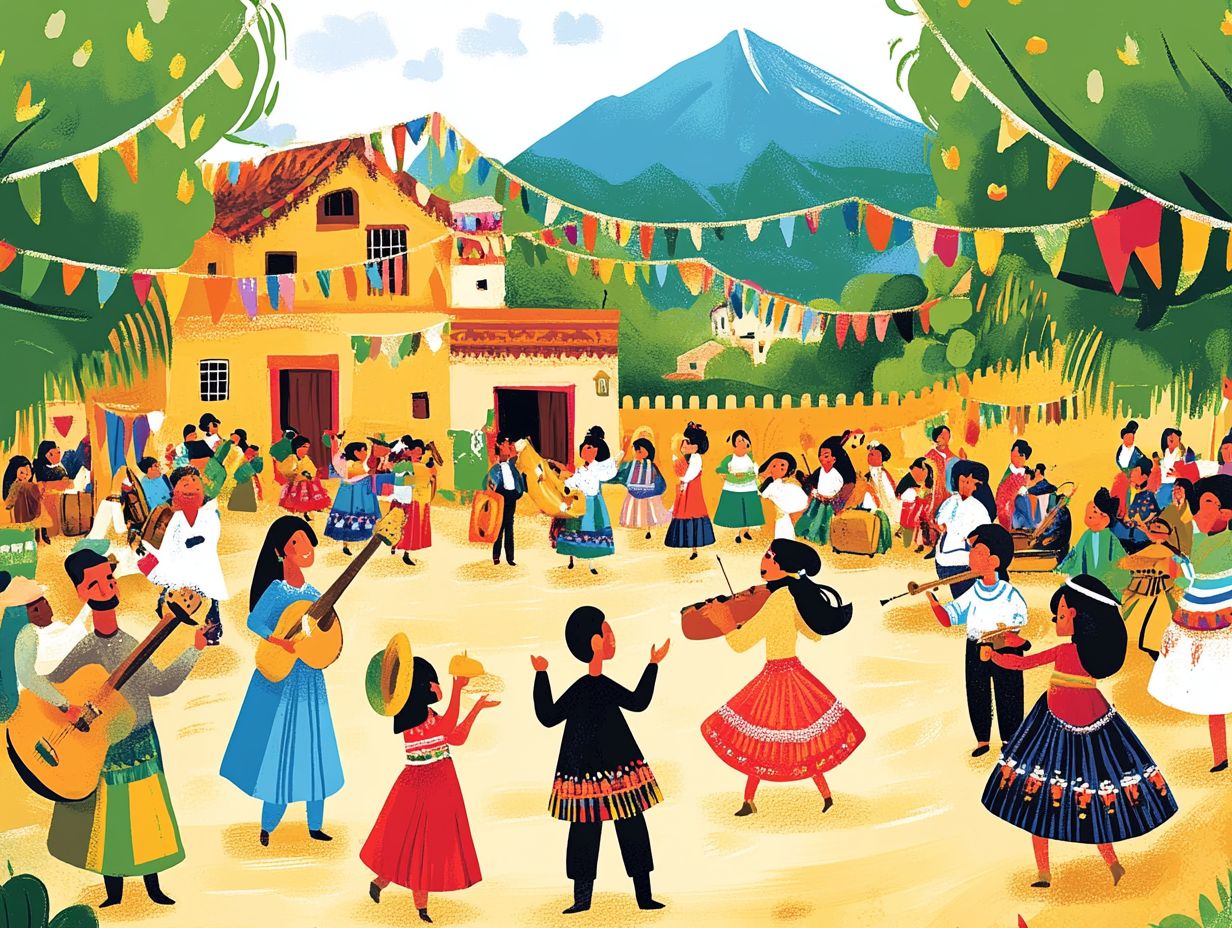
Festivals and celebrations are vibrant expressions of community spirit, offering remarkable opportunities to immerse yourself in local cuisine, customs, and traditions. They enrich your language learning experience.
These events boost social interactions that are crucial for your conversational skills and understanding everyday speech that locals use. You can practice in real-life contexts, engaging with native speakers during these colorful gatherings, deepening your emotional connection to the culture, and enhancing your overall cultural understanding.
Such occasions often showcase traditional dishes that narrate stories of historical significance and regional pride. Meals transform into a delightful way to explore language. From food stalls brimming with local delicacies to cooking demonstrations that unveil culinary techniques, you ll not only savor amazing flavors but also discover the language behind them!
Participating in cultural activities, like dance or music performances, offers an immersive experience that reinforces vocabulary and pronunciation. It helps you grasp nuances in expression.
By intertwining language practice with the richness of festivities, you ll be in an exciting environment that encourages organic conversation and meaningful connections, igniting a passion for both the language and its culture.
Language Immersion Programs
Language immersion programs are carefully designed experiences that blend language learning with cultural exploration. They enable you to elevate your listening and speaking skills through real-world engagement.
These programs typically feature a rich array of interactive activities. Think cooking traditional dishes, attending vibrant cultural events, and diving into local history all designed to deepen your understanding of the language within its cultural context.
By immersing yourself in these experiences, you enhance your vocabulary and gain valuable insights into the cultural nuances that influence language use.
Such programs encourage authentic communication and allow you to engage with native speakers in relaxed settings where conversation flows naturally. This proactive involvement enables you to experiment with the language, embrace mistakes, and receive immediate feedback along the way.
Introducing you to diverse cultural perspectives helps develop your critical thinking skills and cultural sensitivity, ensuring you’re well-prepared to navigate various social situations.
In essence, language immersion programs are dynamic platforms where language truly comes alive. They transform you into a confident communicator equipped with linguistic proficiency and a profound appreciation for the culture that enriches the language.
The Role of Cultural Events in Language Acquisition
Cultural events play a crucial role in your language acquisition journey by offering authentic environments to engage with native speakers. This interaction sharpens your conversational skills and deepens your cultural understanding.
Immersing yourself in these vibrant cultural contexts enhances both your linguistic competence and social interactions. You can use the language naturally in real-world scenarios.
The exposure to various communicative styles and non-verbal cues at these gatherings significantly enriches your overall language development, making the learning experience both effective and enjoyable.
Exposure to Native Speakers and Cultural Context
Engaging with native speakers at cultural events presents invaluable opportunities to refine your conversational skills while immersing yourself in the rich tapestry of cultural context that shapes language use.
This vibrant atmosphere invites you to step beyond your comfort zone, paving the way for authentic exchanges that simply can’t be replicated in a classroom setting.
As you navigate through diverse social environments, you’ll encounter a variety of dialects, idioms, and cultural references that enhance your vocabulary and understanding.
Such active participation can dismantle barriers, enabling you to forge genuine connections. By immersing yourself in these interactions, you gain access to a treasure trove of knowledge about traditions, beliefs, and social norms. This ultimately enriches your overall language acquisition experience.
Building Confidence and Cultural Competence
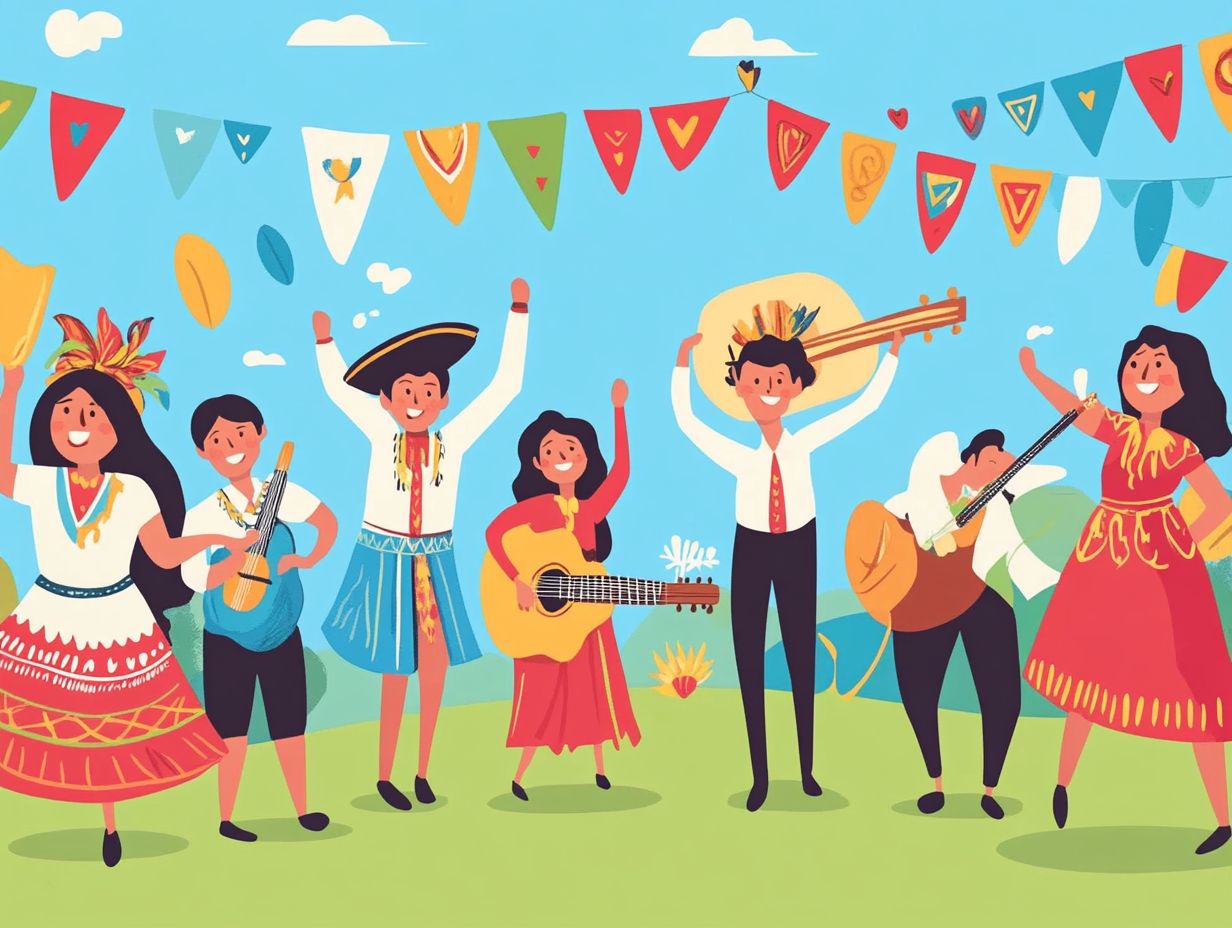
Cultural events act as powerful catalysts for building confidence and cultural competence as a language learner. They create environments where you can practice your language skills and engage in enjoyable recreational activities, highlighting the role of cultural exchange in language learning.
By participating in these events, you will feel your confidence grow as you communicate effectively and navigate the intricacies of cultural nuances and idiomatic expressions. This immersive experience enriches your language journey and fosters social interactions essential for developing a strong sense of belonging within your community.
Take community festivals or cultural fairs, for example. They often feature traditional games, music, and dance workshops, providing practical contexts to apply your language skills.
Joining storytelling sessions or cooking classes allows you to interact authentically with native speakers, deepening your grasp of cultural references and social cues. These engaging activities help you build relationships and form friendships while enabling you to practice public speaking and storytelling in a supportive setting.
As you navigate these social interactions, you cultivate not just linguistic skills but also greater comfort in diverse cultural environments. This experience truly boosts your skills, turning your learning journey into a rich tapestry of connection and growth.
Challenges and Limitations of Using Cultural Events for Language Learning
While the benefits of cultural events for language learning are abundant, challenges and limitations exist that both educators and learners must navigate, especially regarding accessibility and inclusivity.
These factors can greatly impact the ability of diverse groups of language learners to engage in cultural activities. Tackling these challenges is crucial to ensure that cultural events fulfill their intended purpose of promoting linguistic competence and cultural understanding for every learner.
Accessibility and Inclusivity
Accessibility and inclusivity are paramount for cultural events, as they dictate how effectively diverse communities can engage in language learning experiences. It’s essential to ensure that these events cater to a wide range of needs, breaking down barriers and creating an environment where all language learners can flourish.
By addressing accessibility issues like location, cost, and resource availability, you can design more inclusive cultural activities that benefit the entire community. Providing robust interpretation services and translating materials significantly enhances participation for non-native speakers, allowing them to engage with the rich cultural nuances presented. Offering events in multiple languages bridges gaps for those facing language barriers.
Incorporating sensory-friendly environments and considering the needs of individuals with disabilities helps cultivate a welcoming space for everyone. Moreover, developing outreach programs targeting underrepresented groups, such as refugees or immigrant populations, fosters a deeper sense of belonging and community involvement. This effort enriches the cultural dialogue for all participants, creating a vibrant tapestry of voices and experiences.
Balancing Cultural Immersion with Traditional Learning Methods
Balancing cultural immersion with traditional learning methods is crucial for a well-rounded approach to language acquisition, as each offers unique advantages.
By integrating cultural experiences such as attending local festivals or engaging with native speakers you’ll boost your fluency while enjoying the culture. On the flip side, traditional methods provide essential grammatical structures and vocabulary that might be overlooked in a purely immersive setting.
This dual approach fosters a more nuanced understanding of linguistic intricacies, enabling you to navigate both everyday conversations and formal contexts with ease.
When educational institutions emphasize both cultural immersion and traditional learning, they weave a rich tapestry of opportunities, paving the way for meaningful interactions and lasting language retention.
Frequently Asked Questions
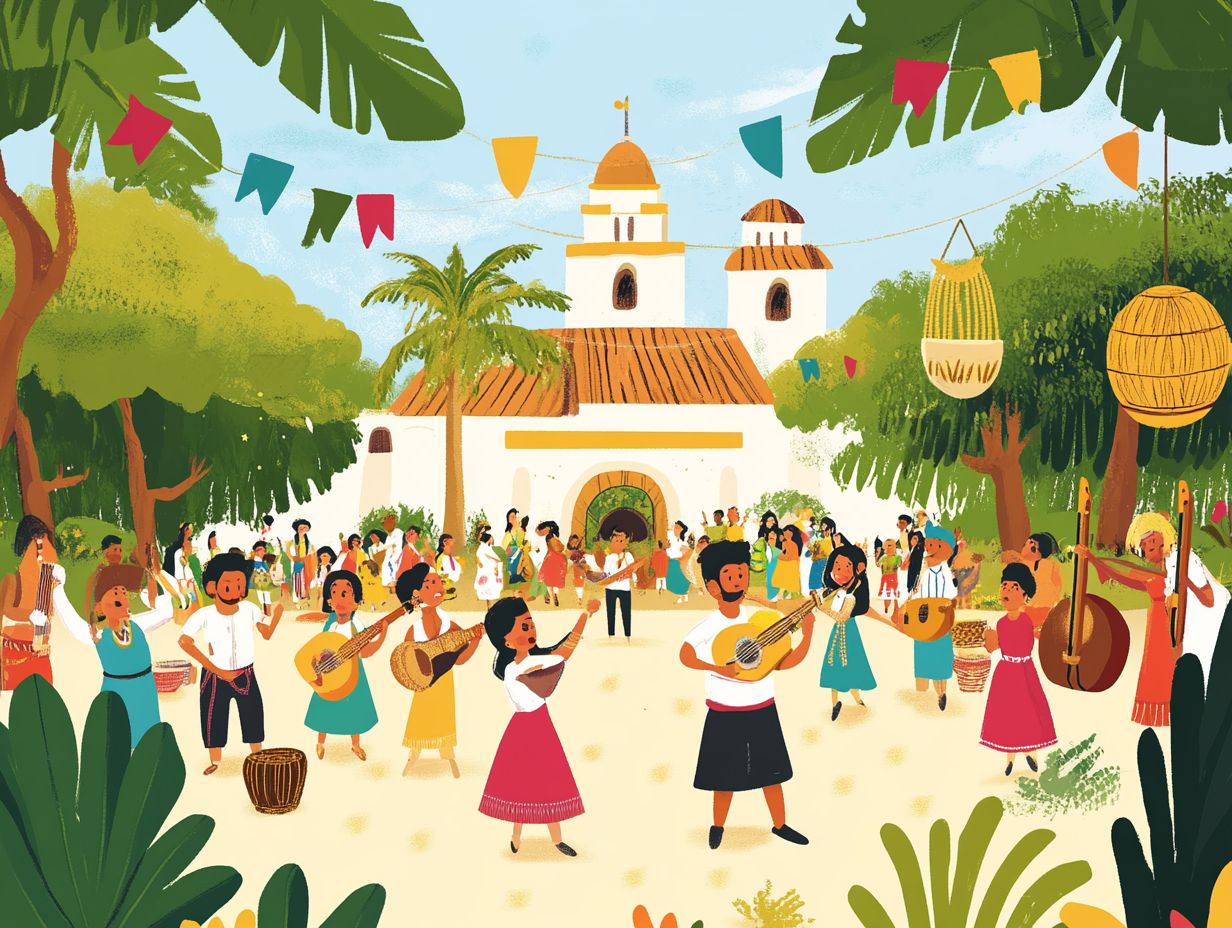
What cultural events impact language learning?
Festivals, parades, celebrations, and performances can all play a significant role in language learning.
How do cultural events affect language learning?
Cultural events introduce learners to new words and common phrases. They also highlight cultural nuances that enrich understanding.
Can attending cultural events improve language skills?
Yes! Attending these events provides real-life practice and deepens cultural immersion.
What challenges come with using cultural events for language learning?
Challenges include grasping cultural references and navigating language barriers. Adapting to various communication styles can also be tough.
How can learners maximize cultural events?
Get involved! Engage with native speakers, ask questions, and jot down new words and phrases.
Do virtual cultural events impact language learning?
Absolutely! Virtual events let you explore different cultures from home. They also offer chances for language exchanges and online learning.


